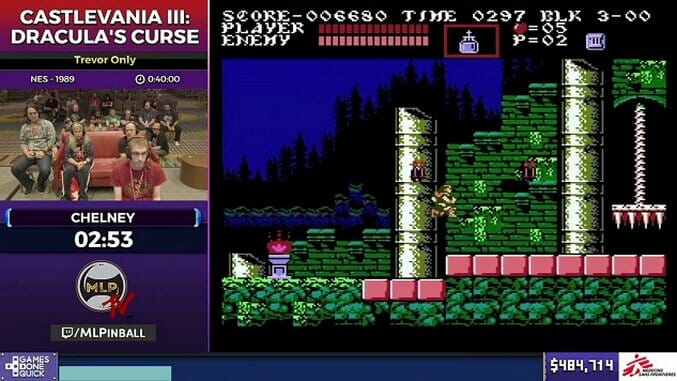Games Done Quick Is a Modern Day Olympics
Images from Games Done Quick's YouTube Page Games Features Games Done Quick
Earlier this week, a newly-discovered damage boost skip through The Legend of Zelda: Ocarina of Time’s Gerudo Gate shaved several minutes off the game’s glitchless speed run. That may sound like complete gibberish, but the rise of tool-assisted speedruns, frame- and pixel-perfect movement, and second-shaving codedigging is coming for the gaming mainstream thanks to the continued success of semi-annual speedrunning event Games Done Quick.
Taking place in January and once again in July (it’s currently running through Sunday July 9, streaming through Twitch and at the GDQ site), GDQ asks volunteers at the pinnacle of their gaming prowess to marathon their favorite games as fast as possible—all for the benefit of charity. Last year GDQ’s summer event raised just over $1.3 million for Doctors Without Borders, with the winter marathon of this year being the first to break $2 million for its charity of choice, the Prevent Cancer Foundation. These donations come from viewers (like you!), whose money allows them to applaud the talent on show, send messages to those playing, and bid on specific requests for the players.
This week of showboating excess celebrates what videogames can be at their highest level, and often beyond. It includes both the hard-to-define glitchless runs—complete game playthroughs that avoid major exploits, but still often involve some sort of non-gamebreaking manipulation—and the purely impure, glitch-intensive, anything-goes races.
“There’s a lot that goes into this that isn’t really obvious,” said a commentator on Thursday night, explaining a trick used to beat the final boss in Chrono Trigger without ever damaging him. The successes are sometimes so subtle that it takes the audience a few moments to register that something’s happened and applaud. Code is scrutinized, players develop communities around certain games, and everyone practices their asses off for years. There’s a reason the speedrunning community treasures older games: there’s been more time to uncover their secrets.
The gamers dedicated to these runs, and more importantly to these games, are my Olympians. They possess a skillset so refined and specific that without proper context, it’s impossible to appreciate. They join athletes who’ve trained their whole lives in the grand televised feat of making schlubs like me say “I bet I could do that.” Everyone that’s ever run track gets a bit more insight into the best in the world; the same goes for here, only for people that’ve sunk weeks of in-game time into something like collecting 100% of Banjo-Kazooie’s myriad of special objects. When they see someone accomplish that feat, livestreamed on Twitch, in only a few hours, they’re wowed like a sprinter watching Usain Bolt. Unlike the streamers, Bolt doesn’t explain how he’s running so fast as he blazes by.
Speedrunning has come a long way since the mid-’90s Doom racers and the emulated, programmed runs of the early ‘00s. Games Done Quick has been a beacon gathering the skilled and allowing those outside these niche communities to appreciate their collaborative, singular efforts—all for a good cause. There’s no factionalism run wild here, but the blanket encouragement of peers. There’s no commentating crew in an off-screen box, but literally sitting on a couch behind the runner right next to the audience in their folding chairs. It’s hard to get more equalized than that.
However, though the event also works hard to provide an antidote to the toxicity that has a penchant to permeate pro gaming, it’s not without its flaws. Mics are muted from profanity, chat is kept semi-courteous by mods (who banned a Twitch chat emote used for transphobic purposes during Monday’s stream), and donations are vetted so there’s a pleasant mix of encouraging messages, inspiring thanks and in-jokes. But the unruly anonymous hate that always crawls out of the woodwork when faces and names disappear still appears. Chat is still mostly a nightmare (but isn’t it always) and most of the competitors and commentators are very white and very much male. But these are things that can change over time.
As this type of gaming becomes more and more popular, the demographics will (ok, should) change and broaden accordingly. In fact, earlier this year, there was a strong showing of female and non-binary attendees. GDQ’s admittance guidelines encourage everyone to apply, regardless of game preference, age (16 and under need a parent or guardian to accompany them to the event if selected), or any other personal information. It’s friendly, only whittling down selections for the two goals of audience enjoyment and variety.
At the end of the day, that’s what I want my sporting events to be like: equally welcoming and awe-inspiring, with the best in the world at very specific things coming together to wow an audience composed of people that may have only tangentially experienced the tasks these competitors are accomplishing. It’s educational, entertaining and charitable—qualities that argue that GDQ should be pushed as the face of high-level gaming instead of over-worked, over-hyped and under-informed League of Legends players in their matching jerseys. The players of GDQ work without goals of making a team or getting a payday, but for the simple love of the sport. The thrill of shaving a second off a world record and making all those late nights worth it. Beautiful simplicity comes from the complex combination of computer science and insane muscle memory. It’s work ethic in pursuit of nothing greater than honor and personal achievement, an old school idea in maybe the newest context imaginable.
Jacob Oller is a writer and film critic whose writing has appeared in The Guardian, Playboy, Roger Ebert, Film School Rejects, Chicagoist, Vague Visages, and other publications. He lives in Chicago, plays Dungeons and Dragons, and struggles not to kill his two cats daily. You can follow him on Twitter here: @jacoboller.